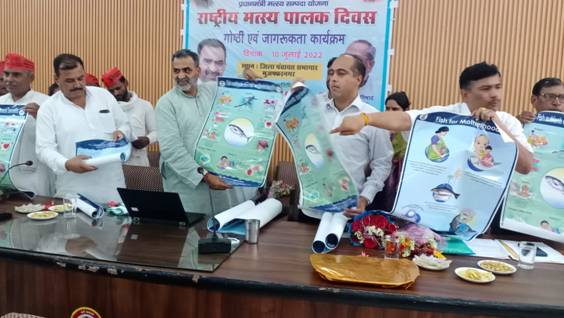HIGHLIGHTS
- Ministers release posters on Domestic Fish Consumption and sustainable production.
- It was started first time in the country on 10th July,1957 at Angul in Odisha.
Delhi: Today is the National Fish Farmers Day. National Fisheries Development Board, Union Ministry of Fisheries, Animal Husbandry and Dairying, celebrated the 22ndNational Fish Farmers Day in a hybrid mode at NFDB Hyderabad. The program is graced virtually by Dr. Sanjeev Kumar Balyan, Union Minister of State for Fisheries, Animal Husbandry & Dairying and Dr. L. Murugan, Union Minister of State for Fisheries, Animal Husbandry and Dairying.
In the event more than 1000 fish farmers, aquapreneurs & fisher folks, professionals, officials and scientists from across the nation participated. During the event, 4 posters as an outreach on Domestic Fish Consumption and sustainable production are released. Poster on “Fish for Motherhood” & “Fish Nutrients and their Wellness Benefits” were released by Dr. Sanjeev Kumar Balyan and posters on “Sustainable Fishing Practices” & “State Fishes of India” were released by Dr.L. Murugan.
Addressing the event, Dr. L. Murugansaid that the country stands second in fish production through aquaculture. This is due to the contribution made by the scientists through development of breeding technologies for different fish species and culture of improved fish varieties. He added that Hon’ble Prime Minister is promoting local for vocal. The country’s fisheries exports were not effected even during Covid pandemic, due to various measures taken by the Government. He said that the country has a vast untapped fisheries potential. Realising the potential of the fisheries sector, the Government has launched the PMMSY, FIDF and KCC for benefit of the fishers and fish farmers in the country. To promote seaweed cultivation the Government of India sanctioned Seaweed Park in Tamil Nadu and fishing harbours are being modernized across the country, the Minister highlighted.
Dr. Sanjeev Kumar Balyan in his address said that government is implementing the flagship scheme of PMMSY for benefit of fishers and fish farmers in the country with a highest outlay of Rs.20050 crore. He said that farmers should utilize the scheme, increase the fish production and productivity, and improve their socio-economic status. There is need to increase awareness of health benefits of fish among the consumers and NFDB has developed nice posters on this aspect.
Shri Jatindra Nath Swain, Secretary Department of Fisheries launched the NFDB Lab project on “Assessment of pathogenic microorganisms along with nutrient and residual contaminant profiling in fish and aqua Feeds”. Onthe occasion NFDB and State Bank of India signed MOU to facilitate FIDF & Entrepreneur Models scheme.
Shri Sagar Mehra, Joint Secretary (Inland Fisheries) highlighted that there is a steady increase in share of fisheries in the country’s GDP. About 2.8 crore people are dependent on fisheries in the country. During the program, the dignitariesinteracted with progressive fish farmers under PMMSY scheme.Fish farmers availing quality seed from NFFBB gave feedback on growth performance of improved seed varieties. North East fish farmers shared their prospects in fisheries sector.
National Fish Farmer’s Day is celebrated on 10th July every year to demonstrate solidarity with all fisher folk, fish farmers and concerned stakeholders throughout the country. Every year, this annual event is celebrated to commemorate Professor Dr. Hiralal Chaudhury and his colleague Dr. Alikunhi for their contribution in achieving the successful induced breeding of major carps on 10th July,1957 at Angul in Odisha for the first time in the country through administration of carp pituitary hormone extract in the breeding of major carps. The technology was later on standardized and fine-tuned by developing synthetic hormone for quality seed production across the country. This pioneering work of induced breeding over the years has transformed the growth of aquaculture sector from traditional to intensive aquaculture practices and led to success of modern aquaculture industry.



